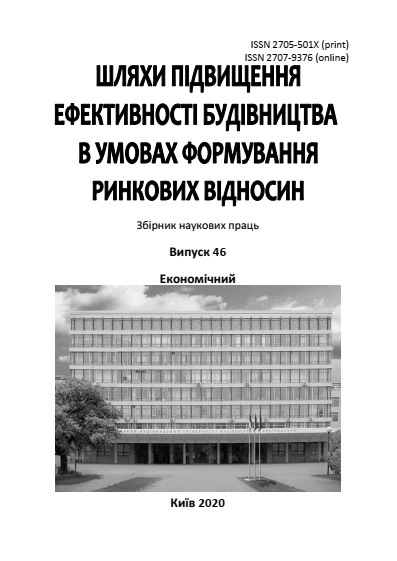Compensatory financing of energy saving projects in the development of «Smart City»
DOI:
https://doi.org/10.32347/2707-501x.2020.46.16-23Keywords:
«Smart City», compensatory financing, energy saving, urbanization, effective managementAbstract
The article studies the financial compensation technology Tax Increment Financing (TIF) and offers suggestions on the prospects for attracting investment in energy conservation projects. Compensatory financing for energy conservation projects will enable them to make effective management decisions related to finding sources of funding, building their rational structure, and to share risks among project stakeholders; to protect other assets from default and increase the level of financial and credit obligations of project owners; to promote the increase of the financial leverage ratio, which will lead to an increase in the profitability of joint-stock capital and a decrease in its value as a part of total capital.
The essence of TIF is to ensure that investor expenses are reimbursed through special funds, which are filled by tax revenues from the revenues of infrastructure facilities created and put into operation. The basis of this mechanism is a redevelopment, which is used to finance the investor, who invests in construction and reimburses his expenses from the special fund, where the taxes paid by the owners of new consolidated objects are accumulated. Such a scheme for financing investment projects uses the effect of increasing taxes as a result of the implementation of projects aimed at increasing the value of real estate.
Based on the conducted research, the main features of the Smart City concept were singled out, as well as their characteristics, the feature of this compensatory technology, which is the locality of the financing object, was identified. Therefore, it is proposed to implement this approach within the framework of the Smart City concept, since it promotes not only the use of modern information platforms of the city's development, but also the principles of sustainable development, including the implementation of energy-saving measures.
References
Климчук М.М. Формування механізму управління ризиками будівельних проектів на засадах компенсаторної технології «Tax Increment Financing» / М.М. Климчук, Т.А. Ільїна, В.О. Поколенко // Бізнес Інформ. 2019. №3. C. 369–374.
Ткаченко В.В. Розвиток цифрової економіки та запровадження енергоефективності в економічну стратегію держави: Монографія / В.В. Ткаченко, О.А. Бондар, М.М. Климчук, В.О. Поколенко, Т.О. Циркун – Івано-Франківськ, вид-во «Фоліант», 2019. – 252 с.
Anthopoulos L. Understanding the smart city domain: A literature review. Anthopoulos. Transforming city governments for successful smart cities. 2015. № 1. Pp. 9-21.
Bland Robelt L. A revenue guide local government / Robelt L. Bland. – Washington, DC: International City Management Association, 1989. – 342 p.
Granath M. The Smart City – How smart can IT be? Discourses on digitalisation in policy and planning of urban development. Granath. PhD thesis. Linkoping Studies on Arts and Science. 2016. № 693.
Huddleston Jack R. Distribution of development costs under tax increment financing. Journal of the American Planning Association. 1986. № 52. P. 194–198.
Klemanski John S. Using tax increment financing for urban redevelopment projects. Economic Development Quarterly. 1990. № 4 (February). P. 23–28.
Man Joyce Y. Tax increment financing and its effects on property values / Joyce Y. Man, Mark S. Rosentraub. – Center for Urban Policy and the Environment, Indiana University (June), 1994. – P. 23–26.
Silva B., Khan M., Han K. Towards sustainable smart cities: A review of trends, architectures,components and open challenges in smart cities. Sustainable Cities and Society. 2018. № 38. Pp. 697-713.
Stratigea A., Papadopoulou C., Panagiotopoulou M. Tools and technologies for planning the devel of smart cities. Journal of Urban Technology. 2015. № 22. Pp. 43-62.
Tkachenko V. Compensatory financing of energy saving projects in construction: modification of «TIF» / M. Klymchuk, V. Tkachenko, А. Ploska // Research Papers in Economics and Finance – 2018.-№ 3 (1).-С. 57-65
Downloads
Published
How to Cite
Issue
Section
License

This work is licensed under a Creative Commons Attribution 4.0 International License.
Authors who publish with this journal agree to the following terms:
- Authors retain copyright and grant the journal right of first publication with the work simultaneously licensed under a Creative Commons Attribution License that allows others to share the work with an acknowledgement of the work's authorship and initial publication in this journal.
- Authors are able to enter into separate, additional contractual arrangements for the non-exclusive distribution of the journal's published version of the work (e.g., post it to an institutional repository or publish it in a book), with an acknowledgement of its initial publication in this journal.
- Authors are permitted and encouraged to post their work online (e.g., in institutional repositories or on their website) prior to and during the submission process, as it can lead to productive exchanges, as well as earlier and greater citation of published work (See The Effect of Open Access).

